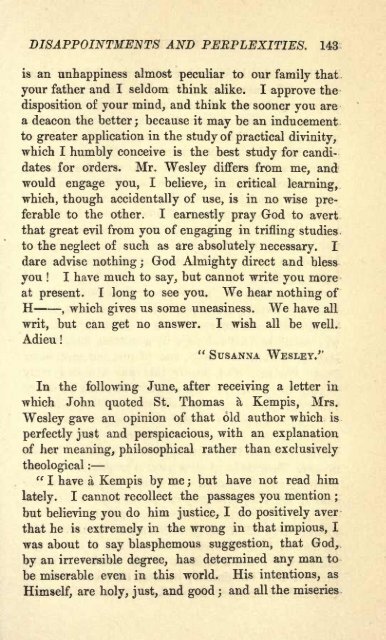Susanna Wesley
This is the story of Susanna Wesley, 1669-1742 Mother of Charles and John Wesley, who were founders of the Methodist Church. Susanna and her husband, Samuel, had nineteen children, ten of whom survived to adulthood. Her son Charles became a well-known hymn writer and her son John became the found of Methodism. Susanna was brought up in a Puritan home as the youngest of twenty-five children. As a teenager, she became a member of the Church of England. She became the wife of a chronically debt-ridden parish rector in an English village. She said, "I have had a large experience of what the world calls adverse fortune." Nonetheless, Susanna managed to pass down to her children Christian principles that stayed with them.
This is the story of Susanna Wesley, 1669-1742 Mother of Charles and John Wesley, who were founders of the Methodist Church. Susanna and her husband, Samuel, had nineteen children, ten of whom survived to adulthood. Her son Charles became a well-known hymn writer and her son John became the found of Methodism.
Susanna was brought up in a Puritan home as the youngest of twenty-five children. As a teenager, she became a member of the Church of England. She became the wife of a chronically debt-ridden parish rector in an English village. She said, "I have had a large experience of what the world calls adverse fortune." Nonetheless, Susanna managed to pass down to her children Christian principles that stayed with them.
You also want an ePaper? Increase the reach of your titles
YUMPU automatically turns print PDFs into web optimized ePapers that Google loves.
DISAPPOINTMENTS AND PERPLEXITIES. 143<br />
is an unhappiness almost peculiar to our family that<br />
your father and I seldom think alike. I approve the<br />
disposition of your mind, and think the sooner you are<br />
a deacon the better ;<br />
because it<br />
may be an inducement<br />
to greater application in the study of practical divinity,<br />
which I humbly conceive is the best study for candidates<br />
for orders. Mr. <strong>Wesley</strong> differs from me, and<br />
would engage you, I believe, in critical learning,<br />
which, though accidentally of use, is in no wise preferable<br />
to the other. I earnestly pray God to avert<br />
that great evil from you of engaging in trifling studies<br />
to the neglect of such as are absolutely necessary. I<br />
dare advise nothing ;<br />
God Almighty direct and bless<br />
!<br />
you I have much to say, but cannot write you more<br />
at present. I long to see you. We hear nothing of<br />
H which<br />
, gives us some uneasiness. We have all<br />
writ, but can get no answer. I wish all be well.<br />
Adieu !<br />
" SUSANNA WESLEY/'<br />
In the following June, after receiving<br />
a letter in<br />
which John quoted St. Thomas a Kempis, Mrs.<br />
<strong>Wesley</strong> gave an opinion<br />
of that old author which is<br />
perfectly just and perspicacious, with an explanation<br />
of her meaning, philosophical rather than exclusively<br />
theological :<br />
" I have a Kempis by me ;<br />
but have not read him<br />
lately. I cannot recollect the passages you mention ;<br />
but believing you do him justice, I do positively aver<br />
that he is extremely in the wrong in that impious, I<br />
was about to say blasphemous suggestion, that God,<br />
by an irreversible degree, has determined any man to<br />
be miserable even in this world. His intentions, as<br />
Himself, are holy, just, and good ;<br />
and all the miseries

















